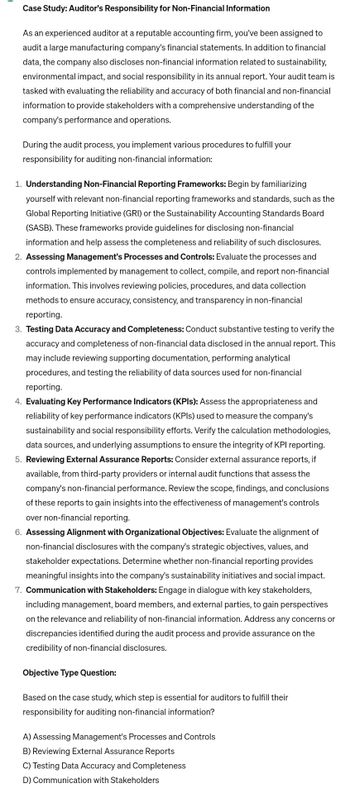
FINANCIAL ACCOUNTING
10th Edition
ISBN: 9781259964947
Author: Libby
Publisher: MCG
expand_more
expand_more
format_list_bulleted
Question

Transcribed Image Text:Case Study: Auditor's Responsibility for Non-Financial Information
As an experienced auditor at a reputable accounting firm, you've been assigned to
audit a large manufacturing company's financial statements. In addition to financial
data, the company also discloses non-financial information related to sustainability,
environmental impact, and social responsibility in its annual report. Your audit team is
tasked with evaluating the reliability and accuracy of both financial and non-financial
information to provide stakeholders with a comprehensive understanding of the
company's performance and operations.
During the audit process, you implement various procedures to fulfill your
responsibility for auditing non-financial information:
1. Understanding Non-Financial Reporting Frameworks: Begin by familiarizing
yourself with relevant non-financial reporting frameworks and standards, such as the
Global Reporting Initiative (GRI) or the Sustainability Accounting Standards Board
(SASB). These frameworks provide guidelines for disclosing non-financial
information and help assess the completeness and reliability of such disclosures.
2. Assessing Management's Processes and Controls: Evaluate the processes and
controls implemented by management to collect, compile, and report non-financial
information. This involves reviewing policies, procedures, and data collection
methods to ensure accuracy, consistency, and transparency in non-financial
reporting.
3. Testing Data Accuracy and Completeness: Conduct substantive testing to verify the
accuracy and completeness of non-financial data disclosed in the annual report. This
may include reviewing supporting documentation, performing analytical
procedures, and testing the reliability of data sources used for non-financial
reporting.
4. Evaluating Key Performance Indicators (KPIs): Assess the appropriateness and
reliability of key performance indicators (KPIs) used to measure the company's
sustainability and social responsibility efforts. Verify the calculation methodologies,
data sources, and underlying assumptions to ensure the integrity of KPI reporting.
5. Reviewing External Assurance Reports: Consider external assurance reports, if
available, from third-party providers or internal audit functions that assess the
company's non-financial performance. Review the scope, findings, and conclusions
of these reports to gain insights into the effectiveness of management's controls
over non-financial reporting.
6. Assessing Alignment with Organizational Objectives: Evaluate the alignment of
non-financial disclosures with the company's strategic objectives, values, and
stakeholder expectations. Determine whether non-financial reporting provides
meaningful insights into the company's sustainability initiatives and social impact.
7. Communication with Stakeholders: Engage in dialogue with key stakeholders,
including management, board members, and external parties, to gain perspectives
on the relevance and reliability of non-financial information. Address any concerns or
discrepancies identified during the audit process and provide assurance on the
credibility of non-financial disclosures.
Objective Type Question:
Based on the case study, which step is essential for auditors to fulfill their
responsibility for auditing non-financial information?
A) Assessing Management's Processes and Controls
B) Reviewing External Assurance Reports
C) Testing Data Accuracy and Completeness
D) Communication with Stakeholders
Expert Solution
This question has been solved!
Explore an expertly crafted, step-by-step solution for a thorough understanding of key concepts.
Step by stepSolved in 3 steps

Knowledge Booster
Learn more about
Need a deep-dive on the concept behind this application? Look no further. Learn more about this topic, accounting and related others by exploring similar questions and additional content below.Similar questions
- The CPA's role in performing audits is important to our society because: O an audit of financial statements helps investors and others know that they can rely on the information presented in the financial statements. O auditors have the primary responsibility for the information contained in the financial statements. auditors issue reports on the accuracy of each financial transaction. auditors provide direct financial advice to potential investors.arrow_forwardAshavinarrow_forwardSteve Ankenbrandt, president of Beeb Corporation, has been discussing the company’s internal operations with the presidents of several other multidivision companies. Ankenbrandt discovered that most of them have an internal audit staff. The activities of the staffs at other companies include financial audits, operational audits, and sometimes compliance audits. Required: Describe the meaning of the following terms as they relate to the internal auditing function: a. Financial auditing. b. Operational auditing. c. Compliance auditing.arrow_forward
- Management should address written representations about a firm's annual audit to the: 1. Shareholders 2. Auditor 3. Board of directors. 4. Firm's attorneys. O 1 O 2 O 3 4.arrow_forwardHow can an auditor use the following topic in his future work? Evaluate financial decision-making to ensure compliance with accounting standards, rules, and regulations. Apply Generally Accepted Accounting Principles (GAAP) to record financial information. Analyze financial statements to inform current business decision-making and draw conclusions about the financial health of a company. Recommend budget planning strategies based on the financial performance of a company.arrow_forward
arrow_back_ios
arrow_forward_ios
Recommended textbooks for you

 AccountingAccountingISBN:9781337272094Author:WARREN, Carl S., Reeve, James M., Duchac, Jonathan E.Publisher:Cengage Learning,
AccountingAccountingISBN:9781337272094Author:WARREN, Carl S., Reeve, James M., Duchac, Jonathan E.Publisher:Cengage Learning, Accounting Information SystemsAccountingISBN:9781337619202Author:Hall, James A.Publisher:Cengage Learning,
Accounting Information SystemsAccountingISBN:9781337619202Author:Hall, James A.Publisher:Cengage Learning, Horngren's Cost Accounting: A Managerial Emphasis...AccountingISBN:9780134475585Author:Srikant M. Datar, Madhav V. RajanPublisher:PEARSON
Horngren's Cost Accounting: A Managerial Emphasis...AccountingISBN:9780134475585Author:Srikant M. Datar, Madhav V. RajanPublisher:PEARSON Intermediate AccountingAccountingISBN:9781259722660Author:J. David Spiceland, Mark W. Nelson, Wayne M ThomasPublisher:McGraw-Hill Education
Intermediate AccountingAccountingISBN:9781259722660Author:J. David Spiceland, Mark W. Nelson, Wayne M ThomasPublisher:McGraw-Hill Education Financial and Managerial AccountingAccountingISBN:9781259726705Author:John J Wild, Ken W. Shaw, Barbara Chiappetta Fundamental Accounting PrinciplesPublisher:McGraw-Hill Education
Financial and Managerial AccountingAccountingISBN:9781259726705Author:John J Wild, Ken W. Shaw, Barbara Chiappetta Fundamental Accounting PrinciplesPublisher:McGraw-Hill Education


Accounting
Accounting
ISBN:9781337272094
Author:WARREN, Carl S., Reeve, James M., Duchac, Jonathan E.
Publisher:Cengage Learning,

Accounting Information Systems
Accounting
ISBN:9781337619202
Author:Hall, James A.
Publisher:Cengage Learning,

Horngren's Cost Accounting: A Managerial Emphasis...
Accounting
ISBN:9780134475585
Author:Srikant M. Datar, Madhav V. Rajan
Publisher:PEARSON

Intermediate Accounting
Accounting
ISBN:9781259722660
Author:J. David Spiceland, Mark W. Nelson, Wayne M Thomas
Publisher:McGraw-Hill Education

Financial and Managerial Accounting
Accounting
ISBN:9781259726705
Author:John J Wild, Ken W. Shaw, Barbara Chiappetta Fundamental Accounting Principles
Publisher:McGraw-Hill Education